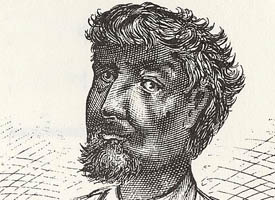- Details
 Jean Baptiste Point du Sable was born on March 3 in St. Marc, Haiti (formerly Sainte-Domingue). While the year of Du Sable’s birth is unknown, it is estimated to have been between 1745 and 1750.
Jean Baptiste Point du Sable was born on March 3 in St. Marc, Haiti (formerly Sainte-Domingue). While the year of Du Sable’s birth is unknown, it is estimated to have been between 1745 and 1750.
Du Sable traveled to the Great Lakes region in the 1770s, managing an Indiana trading post before settling on farm land in present-day Chicago with his wife, Catherine, and their two children. Du Sable’s farm provided an important link in the fur and grain trade of the time.
Known as the “Father of Chicago,” Du Sable was the first settler of Chicago and the city's first black resident. He moved to Missouri in 1800 where he lived the remainder of his life.
Learn more:
Read more about the life and accomplishments of Jean Baptiste Point du Sable
Learn more about The DuSable Museum of African-American History, a museum on Chicago’s South Side dedicated to the study and conservation of African-American history
- Details
 Fred Hatch, a McHenry County farmer who studied agriculture at the University of Illinois in Urbana, built the nation’s first vertical silo in August of 1873. Unlike pit-style silos that were common in Europe at the time, Hatch’s silo was vertical and reached 24 feet tall. The original silo was filled with cow feed and was followed by the construction of two additional silos on the Hatch property.
Fred Hatch, a McHenry County farmer who studied agriculture at the University of Illinois in Urbana, built the nation’s first vertical silo in August of 1873. Unlike pit-style silos that were common in Europe at the time, Hatch’s silo was vertical and reached 24 feet tall. The original silo was filled with cow feed and was followed by the construction of two additional silos on the Hatch property.
While silos became common on farms across the country almost immediately, Hatch wasn’t recognized for his achievement until nearly 50 years later in an article in Dairyman Magazine.
Learn more:
Read more about Fred Hatch’s silo invention
Why do farmers need silos?
- Details
 For the third year in a row, Illinois has ranked first nationwide in green building efforts. A recently released report by the U.S. Green Building Council, a nonprofit coalition of building industry leaders, ranked states by analyzing each in terms of square feet of LEED certified space per resident.
For the third year in a row, Illinois has ranked first nationwide in green building efforts. A recently released report by the U.S. Green Building Council, a nonprofit coalition of building industry leaders, ranked states by analyzing each in terms of square feet of LEED certified space per resident.
The LEED rating system grades projects in five green design categories, including sustainable sites, water efficiency, energy and atmosphere, materials and resources and indoor environmental quality. Throughout last year, Illinois certified 161 LEED projects representing nearly 44 million square feet of real estate. A list of the larger LEED-certified projects include the Virgin Hotel in Chicago, Chase Tower in Chicago, the NU Technological Institute in Evanston and the S&C Electric Building #14 in Chicago.
Learn more:
What does LEED certification mean?
- Details
 It’s been 30 years since the Chicago Bears won Super Bowl XX against the New England Patriots at the Louisiana Superdome. The Bears scored an impressive 46 points against the Patriots, who only managed a field goal in the first quarter and a touchdown in the fourth quarter.
It’s been 30 years since the Chicago Bears won Super Bowl XX against the New England Patriots at the Louisiana Superdome. The Bears scored an impressive 46 points against the Patriots, who only managed a field goal in the first quarter and a touchdown in the fourth quarter.
The 1985 Bears team finished the season with an impressive 15-1 record. The team, under legendary coach Mike Ditka, included Pro Bowl quarterback Jim McMahon and rookie lineman William “The Refrigerator” Perry and an impressive defensive lineup that allowed the fewest points of any team during the season.
Learn more:
1985 Chicago Bears – Where are they now? (ESPN)
- Details
 Vincent van Gogh, a post-impressionist painter who was born in 1853 in the Netherlands, completed 860 oil paintings and more than 1,300 watercolors during his short life. Van Gogh’s bedroom in Arles, France was the site of much of his artistic creations, so much so that he created three similar paintings of his room, all known as The Bedroom.
Vincent van Gogh, a post-impressionist painter who was born in 1853 in the Netherlands, completed 860 oil paintings and more than 1,300 watercolors during his short life. Van Gogh’s bedroom in Arles, France was the site of much of his artistic creations, so much so that he created three similar paintings of his room, all known as The Bedroom.
For the first time in North America, all three of Van Gogh’s bedroom pieces will be on display at Chicago’s Art Institute. The display, located in the Institute’s Regenstein Hall, will open on February 14 and run through May 10.
Learn more:
Read more about The Bedroom display coming to Chicago’s Art Institute
Read more about the life and accomplishments of Vincent van Gogh
More Articles …
- Did You Know? The Chicago Bulls are celebrating their 50th season
- Did You Know? Today is National Popcorn Day
- Did You Know? Happy Days actor Tom Bosley was from Illinois
- Did You Know? Literary figure John Dos Passos was from Illinois
- Did You Know? Michael Jordan retired from the Bulls 17 years ago today





